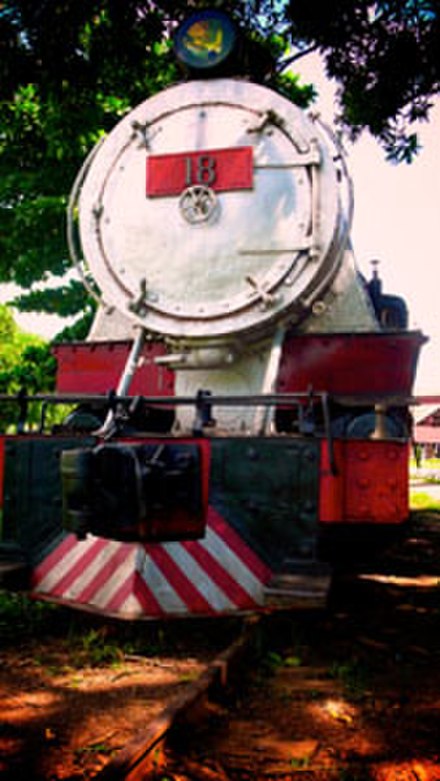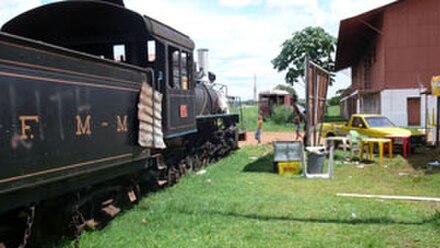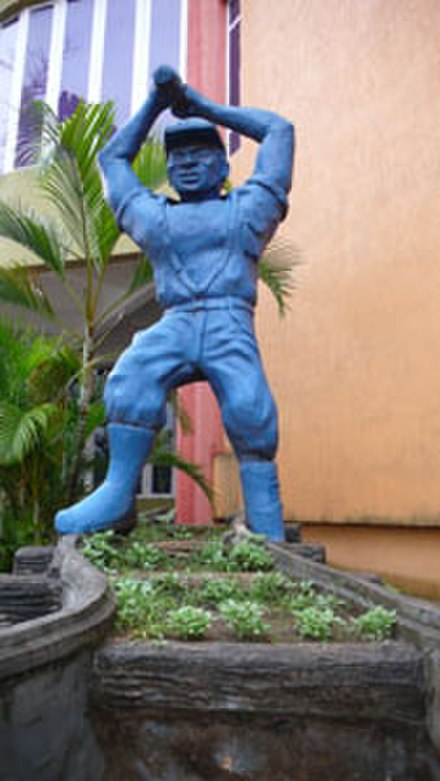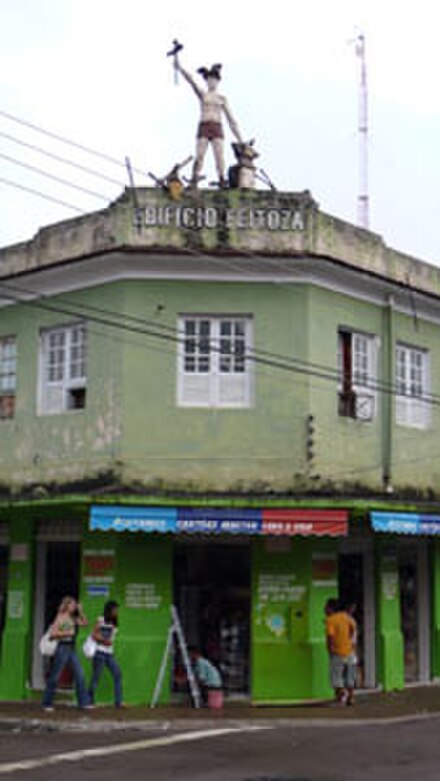Porto Velho - the capital of the Brazilian state of Rondônia, in the upper Amazon River basin
Porto Velho is the capital of the state of Rondônia in Brazil.
Understand

Get in
By plane
- Governador Jorge Teixeira de Oliveira International Airport (IATA: PVH), -8.713611°, -63.902778°. There are several connections from major cities with LATAM and GOL throughout the country as well as regional flights with smaller carriers such as Ocean Air, Rico and TAVJ. 2022-08-03
By train
Although Porto Velho has a railway station there are no trains in or out of the city. For tourist purposes the train was expected to work but don't expect this to happen at any time in the near future. For the Maria Fumaça telenovela part of the track has been cleaned.

By car
- From Rio Branco, follow the BR-364, 544 km. From Cuiabá, take the BR-070, then BR-174, and then the BR-364, total distance 1456 km.
By bus
From the Rodoviária (bus station) there are buses to most big cities in Brazil. Cuiabá is 24 hours away, Brasilia is 36 - 48 hours away, and São Paulo/Rio de Janeiro are about 60 hours. To the west the nearest big city is Rio Branco, about 7 - 10 hours away, all depending on the type of bus service you buy.
The town of Guajará-Mirim on the border with Bolivia is five hours away, and from the small airport across the border there are flights to anywhere and everywhere in Bolivia.
Transacreana buses go all the way to Recife, in the Atlantic coast, almost 5,000 km away. Tel.: (11) 6698-7399 and (61) 8402-8418.
Eucatur is the main line in this region with well equipped buses and staff.
By boat
There is a boat to Manaus two-three times per week. Hammock class (bring your own hammock) is about R$100, a cabin R$300, and a double cabin R$350. Prices are somewhat negotiable. Before booking a boat make sure to check the boat, captain and crew out and try to negotiate with them instead of one of the 3 or 4 agents at the entrance of the harbour. Take care walking in the harbour area, it is not one of the nicest places to be in, take as little as possible with you when going there.

Get around
See
- Railway station Estação da Ferrovia, Ferroviária. Built as compensation for Brazil taking over the state of Acre from Bolivia, and to transport rubber and other Amazon produce. Since long not operational, the station is rapidly suffering from decline. The once excellent museum is now closed for reforms, with nobody able to tell when it will open again. The trains have long since seen their last maintenance due to lack of funding. For the novela Maria Fumaça part of the track was restored. The train was also supposed to be operational for tourism purposes, but the project has not finished to date. All in all, the terrain is interesting enough to see and imagine the hardship it took to build in the heat.

- There's a small promenade (Beira Rio) with a number of bars looking out over the Rio Madeira at the end of Av. 7 de Setembro. A nice place to watch the sunset.
- Caixas D'água, Porto Velho's post card. Built for the Bolivia railway now 3 water towers on a square in reform. To get there: Facing the entrance of the railway station go to your right and keep walking. Can't miss. Sometimes illuminated at night for nice photos. To make the best one go to the last square on 7 de Septembro, walk up to the Clube da Ferrovia and turn left.
- Casa da Cultura just off the square with the Caixas D'água. Here you'll find changing expositions by local artists and once done an exhibition of local culture. Free.

- Catedral On Dom Pedro II the main church of Porto Velho. Simple on both the inside and outside but well worth a visit.

- Weekly Market Porto Velho hosts a lively weekly market, Feira Cai na Agua, turn left at the Clube da Ferrovia on 7 de Setembro. Starting as early as 5AM on Sundays, this is your opportunity to buy and taste good local flavors such as açaí, tacacá, vatapá, molho tucupi apimentado or see a live chicken slaughter on the off side of the market. Lots of local fruit and vegetables, fresh caldo de cana (sugarcane juice) and açaí. Try the last one with guaraná, banana and granola.
- Edificio Feitoza is one of the older structures in the centre. dated 1945.

Do
When available do go and eat an açaí with guaraná and granola. You'll love the taste of this dark brown sweet local fruit. On the weekly market or on the central square get a vatapá or tacacá. Maybe you won't like the taste but when you eat the included green leaves in the latter, you'll be sure to have a numb tongue for an hour or so.
As there is virtually no tourist infrastructure in Porto Velho, you'll be better off renting a car to explore the surroundings. Go either west on the BR-364 and look for signs Candeias, the place where Porto Velho actually started (to be reached by local bus as well). Move a bit up and visit the cemetery or visit the Santo Antonio waterfall. To the west take the balsa and drive up to Humaitá (about 200 km, no gas intermediate gas stations) on the road to Manaus.
Rent a car from a respected car rental agency; The cost of car rental is about R$100 per day excluding insurance (about R$25 per day). Make sure you rent your car at the local Hertz, Localiza or Avis. They are close to the rodoviária (bus station). When you exit walk to your right and look for it on the other side of the road. There are plenty of other car rental places around but you will probably end up renting a car from a private person with no guarantees nor insurance. The costs are about the same so don't expose yourself to the risks involved with renting from private persons.
Buy
Nothing much typical to buy here except or the wooden replicas of the Caixas d'água or a hammock when you want to undertake the boat trip to Manaus. There are some souvenir shops on and close to 7 de Setembro if you want to give it a try.
Eat
- SESC Centro, For a real cheap and if you like healthy meal go here. Next to the postoffice (correios) on Av. 7 de Setembro on Dutra. Government subsidised training centre/ school.
- Restaurante Clube Ferroviaria, Av. 7 de Setembro, two blocks from the river, in a sports complex. Comida por kilo place, serving the standard rice and beans for reasonable prices. Good service.
Budget
- Cha, a little bit further up on Dutra you will find one of the better Por Quilo's you'll ever find at around R$20 per kilo.
Mid-range
- Nova Roma At the end of 7 Septembro right across the Mercado Municipal you'll find one of 3 branches of Nova Roma, a very good, efficient and hygienic Panificadora. You'll probably have the best hamburger in Porto Velho if not the entire Amazon region. The Nova Roma Especial at R$6.95 serves most as a complete meal. Make sure Paulo does the cooking. First time visitors will probably receive double the amount of suco (fruit juice) than ordered. Don't expect the same to happen at your next visit. If you don't like your juices too sweet order without sugar!
Splurge
Drink
Every Tuesday, Thursdays and Saturdays there is a Forro (dance) at the Mirante I & II. Walk all the way up from Av. Farquar - parallel to the Beira Rio (riverside) and follow the noise a bit to your left. The street gets blocked, there is security, you probably will be checked entering, but don't let that set you off. You'll probably have a good time doing what the locals do.
For a bit more upscale experience take a taxi and go to a pseudo authentic beer brewery. The hot one in Porto Velho is Public Haus.
Sleep
Budget
There are some cheap hotels just across the street from the Rodoviária.
- Missionario Av. 7 de Setembro. Cheap, 10 reais for a room with fan, but many cockroaches and mosquitoes. Not very clean.
- Nunes Av. 7 de Setembro. Cheap at R$45 for a room with fan - A/C, a bit noisy, friendly famaliy run. Lots of truckdrivers. Doubles as central 'love hotel'
- Yara Av. 7 de Setembro. reasonable at R$65 a double. Rooms are better as Nunes, the beds seem to be made from the same hardboard.
- Tia Carmen Av. Campos Sales 2895, (almost corner of Carlos Gomes) about six blocks from Av. 7 de Setembro. Most expensive rooms have a/c, private bathroom and tv, cheapest only a fan, for R$25. Clean, breakfast included, lanchonete in front of hotel.
Mid-range
- Hotel Samaúma de Porto Velho Around R$125 but expect to pay more on holidays. Clean rooms, noisy AC, nice service. Breakfast included. Rua Dom Pedro II, 1038 - (69) 3224-5300 - hotel.samauma@hotmail.com
Splurge
Connect
Stay safe
Porto Velho has the dubious honor of being one of the most dangerous cities in Brazil, so take care!
Cope
Go next
Porto Velho
portovelho.ro.gov.brPorto Velho
2nd-order administrative division
Rondônia
Primary administrative division